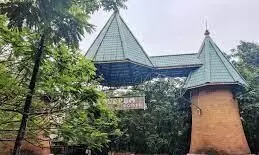
Greetings to the 'City of Literature'
text_fieldsKozhikode, which had been identified in world trade maps centuries ago, now holds a prize position among global cities of literature. The official declaration by UNESCO (United National Educational Scientific and Cultural Organisation) of Kozhikode as a city of literature etook place yesterday. Among the 55 new locations added by UNESCO to its list, Kozhikode represents the sole literary city of India. Alongside this, the Music Cities in the world list includes Gwalior. Following yesterday's conferment of the status in Kozhikode, the formal announcement of the City of Literature, title will take place in Braga, Portugal, in the first week of July. This centre of culture, which had carved its own niche centuries ago, is making its presence known through UNESCO's recognition.
Kozhikode's status as a city of literature is based on its extensive heritage of letters ingrained in the historical and contemporary landscape. The city is dotted with 62 public libraries, over 540 reading rooms, more than 70 book publishing houses, numerous cultural institutions nurturing literature and culture, and several literary events and initiatives throughout the year. All these together contribute significantly to the cultural enrichment of Kozhikode, making it a centre that cherishes literature. The city has its own share of literary celebrities, including two recipients of the Jnanpith Award. From the beginning of the twentieth century, literary works such as "Muhayuddin Mal", "Kundalatha" (by Appu Nedungadi) and "Indulekha" (by O. Chandu Menon) many contemporary compositions have been written and contributed to the literary treasure of Kozhikode. However, Kozhikode's unique feature lies not only in its literary heritage but also in the active participation and patronage of literary figures and publishers. Public engagement through libraries and reading rooms, along with the recognition and dissemination of literature and cultural interactions through music and cinema, highlight the social contribution of Kozhikode in enriching cultural diversity. Kozhikode is a city chosen as their place of action by scores of literary figures including SK Pottekkatt,, Vaikom Muhammad Basheer, KA Kodungallur, MT Vasudevan Nair, NP Muhammad, UA Khader, Thikodiyan, P Valsala, Uroob, KT Muhammed, Sanjayan, Kunjunni Mash and NN Kakkad. Organizations like Kerala Granthasala Sangham, initiated in 1958, have played a significant role in promoting literary activities. The Malabar Library Conference held in 1937 was a remarkable event in the city's cultural history in which 300 delegates and 140 public libraries participated. The presence of the Public Library since 1927 also reflects the city's commitment to literature and cultural exchange. In the past, the Mappila Pattu (the lyrical genre of Muslim community in Malabar) poets effectively communicated with the illiterate masses. It can also be said that Kozhikode's literary conversations have been vibrant, interacting strongly with the public and academia alike. Kozhikode's heritage of embracing human essence, freedom, and cultural pluralism has glorified the city on the global literary map.
Zainuddin Makhdooms of Kozhikode who wrote anti-imperialist poems became dear to the Zamorins. But Kozhikode stood in the forefront of the resistance against foreign invasion which started with the Portuguese who exploited the hospitality of Kozhikode. And reading rooms sprang up all over the region as part of the enlightenment linked to the national liberation movement. Kozhikode has also been in the vanguard of cultural resistance for liberation of Palestine and against the citizenship amendment act. When the city is being conferred the status of city of literature, may it be an occasion of reiterating once again its own commitment to humanitarian values. It is also a responsibility. And may the status of India's first city of literature be marked by radiating its humanitarian and cultural richness further, beyond the building of statues and the fanfare of centenaries.























